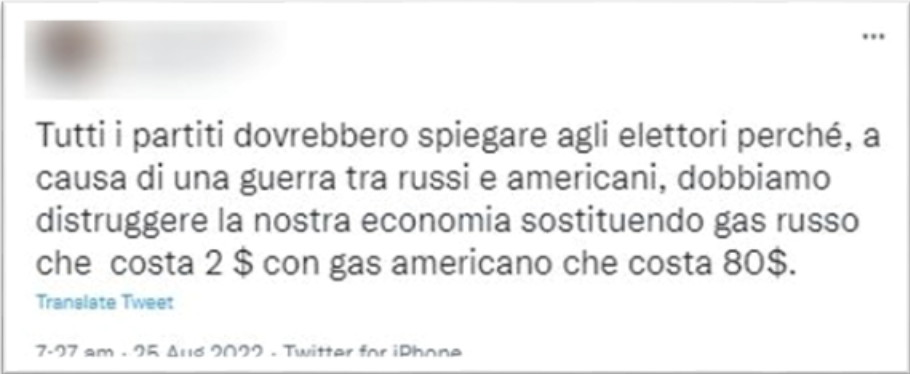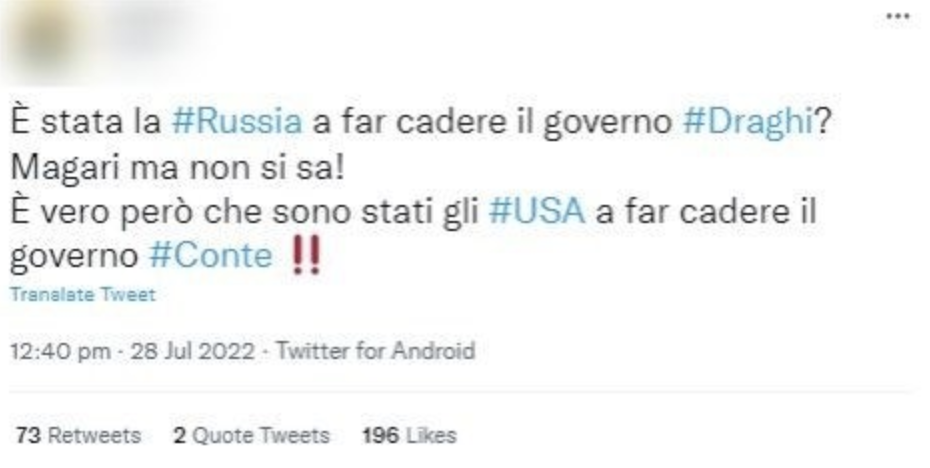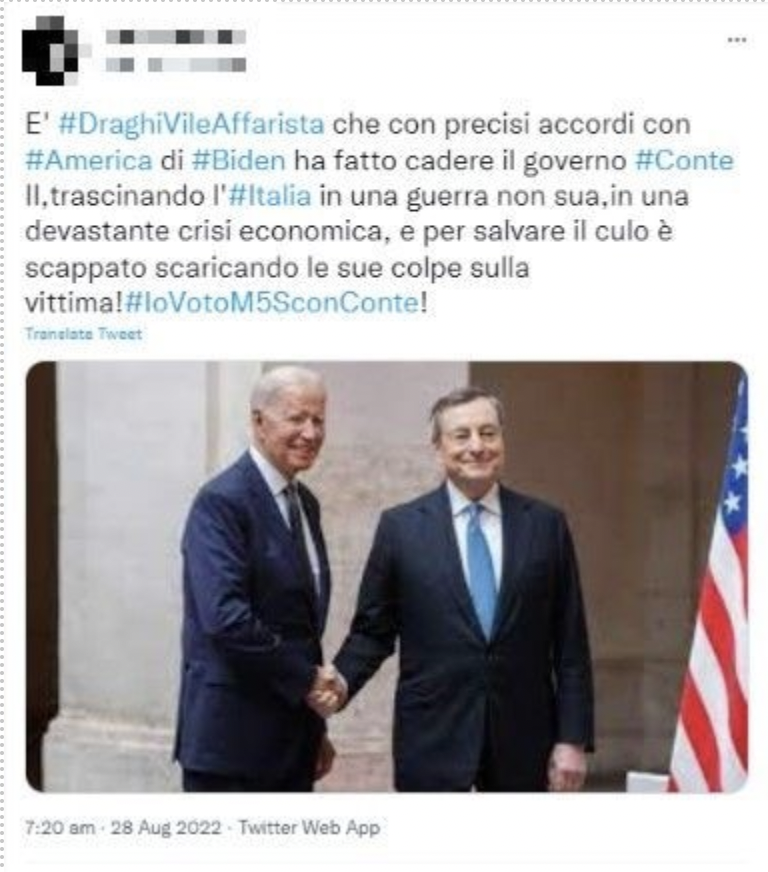Understanding Italian pro-Kremlin Twitter Users in the run up to the Sept 25 General Election
21 September 2022
This Dispatch provides the main findings from an investigation into the beliefs and political preferences of a set of 500 pro-Kremlin accounts ahead of the upcoming Italian elections. It examines the role played by the pandemic in pushing users toward alternative news sources that are now spreading pro-Kremlin disinformation.
________________________________________________________________________
On 25 September 2022, Italian citizens will go to the polls to vote in a general election. Both COVID-19 and the conflict in Ukraine have played important roles in further balkanising an already divided and apathetic electorate as candidates attempt to rally voters across the country. Trust in political parties in Italy is already low, and the latest polls suggest between 35 and 44 percent of citizens will not vote or are still undecided.
Previous research by ISD suggests that pro-Kremlin narratives are obtaining significant traction and visibility in Italy across different social media platforms. However, the question of which parties pro-Kremlin voices will support has remained unanswered throughout the campaign period. A new investigation by ISD indicates that the only mainstream parties that received favourable coverage were League and the Five Star Movement.
Analysis of 500 Twitter users sharing pro-Kremlin sources in Italian found that hashtags in support of each of these parties were shared by at least 200 unique accounts out of 500. The new party Sovereign and Popular Italy is also posted about favourably, but mentions of it were limited in number. These pro-Kremlin users were overall extremely negative towards both the right-wing and centre-left coalitions standing in the election, often implicating them in Great Reset and New World Order conspiracy theories, and blaming them for the poor management of the COVID-19 pandemic and for the introduction of vaccination certificates. Disaffection with mainstream politics is such that some users have been vocally supporting abstentionism under the hashtag #IDontVote (#iononvoto).
The war in Ukraine has not only caused divisions within the centre-right coalition in Italy: media coverage of the events is also dividing the public. 23% of respondents believe that the images of alleged war crimes committed by the Russian army are actually staged by the Ukrainian government, and 46% do not trust mainstream coverage of the war, according to a recent poll.
Our research found that articles from a set of 27 websites flagged by NewsGuard as propagating pro-Kremlin disinformation have been tweeted over 750,000 times since the start of the war, totalling over 10.98M visits only in August 2022. This analysis shows these domains had in many cases acquired and retained an audience during the COVID-19 pandemic, when they spread misinformation about the virus and fomented division in response to measures like the green pass (Italy’s vaccination certificate). The users drawn to these outlets for their COVID coverage appear to have remained loyal to the outlets since then.
Methodology
ISD used NewsGuard’s list of 27 pro-Kremlin news outlets that produce content in Italian to identify the panel of 500 pro-Kremlin Twitter users as the basis of this study. First, analysts built an ad hoc semantic dictionary related to the war in Ukraine, and used it to identify all users that had sent war-related tweets that link to content from the above-mentioned news outlets. Second, analysts removed all accounts with an insignificant audience (<1,000 followers) and focused on accounts that had shared war-related content from pro-Kremlin news outlets the most between 24 February 2022 and 31 August 2022. This yielded a dataset of 500 accounts.
Once this set of 500 pro-Kremlin accounts was identified, ISD collected their tweets between 21 July 2022 (the day on which the Draghi government collapsed) and 1 September 2022, using a combination of semantic dictionaries and qualitative analysis to understand their viewpoint on the Italian election, the war in Ukraine and COVID-19.
To understand the broader pro-Kremlin ecosystem in Italy, ISD also investigated the overall popularity of the 27 news outlets identified by NewsGuard, and their evolution over the past three years.
Findings
Analysis of the 1.6M tweets posted by the 500 pro-Kremlin Twitter accounts since the day that the Italian government collapsed (21 July 2022) until early September highlights three key topics of interest: the upcoming Italian elections (383K tweets), the war in Ukraine (177K tweets) and COVID-19 (126K).
Chart 1: The figure above shows the volume over time of tweets about COVID-19, the war in Ukraine, and elections in the run up to the election, from 21 July 2022 to 1 September 2022. Topics represented in this figure are not mutually exclusive and the same post would appear twice if it included keywords from more than one category e.g. a post mentioning both the war and the election.
Political support ahead of the elections
The main focus for the 500 pro-Kremlin accounts around the election appears to have been criticism of the centre-left alliance, Democratici e Progressisti (Democrats and Progressives), which is mentioned in almost one third of the tweets regarding the elections. Attacks focus primarily on the party’s management of the pandemic, with many users attacking the Italian Health Minister Roberto Speranza using the hashtags #speranzaassassino (Speranza Killer) and #speranzaingalera (Speranza in jail). Within the right-wing coalition, the leader of Fratelli d’Italia (Brothers of Italy) Giorgia Meloni, is instead subject to several attacks on account of her ‘unpatriotic’ support for NATO and Ukraine, and for the lack of a firm stance against COVID-19 restrictions.
Chart 2: Political parties, ranked by number of mentions in tweets from pro-Kremlin users
Although most activity focused on criticising politicians and their handling of both the Ukraine conflict and the pandemic, users also expressed support for three political parties. League, the Five Star Movement, and Sovereign and Popular Italy, each received support largely due to their stance on Ukraine and Russia. In particular, the Five Star Movement was praised for their pledge not to send arms to Ukraine, League for their position against Russian sanctions, and Sovereign and Popular Italy for their position against NATO, Russian sanctions, and the EU.
While Sovereign and Popular Italy has the greatest number of pro-Russia points in its manifesto, this is not reflected in its popularity within this group of 500 accounts. Only 7% of total discussions about the elections mention the party, whereas hashtags in support of League and the Five Star Movement were both used by at least 200 accounts each.
Conversations about both the centre-right and centre-left coalitions were found to include conspiracy narratives and disinformation. In particular, politicians who had supported COVID-related restrictions and the green pass during the pandemic were accused of advocating for the Great Reset and/or New World Order (NWO) – conspiracy theories synonymous with secret cabals seeking world domination. Conspiratorial narratives were also shared about Minister of Health Speranza, Brothers of Italy’s Meloni, and Italy’s Prime Minister Draghi, among others. None of the tweets containing disinformation included a fact-checking link nor an informational label, two of the measures Twitter commonly uses to restrict the spread of false and misleading content.
Interestingly, pro-Kremlin users were found to be divided on the propriety of casting a vote in the current circumstances. Supporters of abstentionism spread the hashtag #iononvoto as a way to fight against the establishment and against the “dictatorial regime” that imposed restrictions during the pandemic. Others used the hashtag to criticise specific political parties that they believe no longer deserve their trust and votes, and to express disillusion with the state of Italian politics in general. Numerous users, however, used the same hashtag to criticise abstentionism, stating that not voting would only amount to more support towards the establishment and even claimed that this course of action was being covertly pushed by the Democratic Party, which they said would directly benefit from it.
Discussion of Italian Political Parties
The activity of the 500 most prolific and most followed pro-Kremlin accounts in this dataset also reveals that, rather than displaying a pro-Putin or pro-war rhetoric, they have recently focused on themes much closer to home.
Discussions about Ukraine included in fact multiple references to economic sanctions and the energy crisis, such as #sanzioni (sanctions), #bollette (bills), and ‘gas’. These keywords began to start trending towards the end of August. The most popular tweet referring to the energy crisis (below) states: “every party should explain to the electorate why, due to a war between the Russians and the Americans, we have to destroy our economy by substituting Russian gas that costs $2 with American gas that costs $80.”

Figure 1: The tweet reads: “every party should explain to the electorate why, due to a war between the Russians and the Americans, we have to destroy our economy by substituting Russian gas that costs $2 with American gas that costs $80.”
Another highly recurring keyword in the set of tweets about Ukraine was “NATO”, which appears over 4,600 times. The most popular tweets are critical of mainstream political parties for allegedly having “submitted to NATO” and for agreeing to send weapons to Ukraine. Similarly, mentions of Zelensky also mostly occur among criticism of politicians for having pledged their support to Ukraine.
Much of the discussion about the election from these accounts focused on domestic issues and on the repercussions of sanctions on the cost of living in Italy. Where Russia is mentioned in these conversations, it is typically to advocate for restoring Italy’s friendship with the country and to accuse the US of pushing Draghi and Italy into an anti-Russian stance.1 Some of these accounts also claim that the US was behind the fall of Conte’s government and the appointment of Mario Draghi as Italy’s Prime Minister.


Figure 2: The tweet reads: “Was it Russia to cause the fall of Draghi’s government? Perhaps, but we don’t know! It is true though that it was the US who caused the fall of Conte’s government”


Figure 3: The tweet above reads: “It was Draghi, the cowardly businessman, who with specific agreements with the US and Biden caused the fall of the government Conte II dragging Italy into a foreign war, into a devastating economic crisis. And in order to save his own ar** he has escaped blaming his own fault to the victim [Conte]. #IvoteforTheFiveStarMovementwithConte”
COVID-19
Although COVID-19 restrictions in Italy have been lifted as of 1 June 2022, the resentment of the measures taken by the government to restrict the spread still seems to play an outsized role in conversations from pro-Kremlin users.
Tweets related to COVID-19 mostly mention vaccines, the green pass, and Pfizer, as well as the hashtags #novax, and #obbligovaccinale (mandatory vaccinations). Popular tweets about COVID-19 frequently criticise the recently fallen government for its COVID-19 regulations, often referred to as ‘dittatura sanitaria’ (health dictatorship). Many of these tweets also include references to known conspiratorial narratives such as the Great Reset and the New World Order. The green pass is also mentioned over 2,400 times in the context of the elections, mainly in reference to political parties who have supported green pass restrictions.
Disinformation, hybrid threats and the role of ‘alternative’ news sources
In the last stage of this investigation, ISD took a closer look at how the 27 sources being shared by these accounts became so popular among these accounts. In order to do this, the timeframe for analysis was extended to January 2019 – September 2022. Results show that these alternative sources were able to attract new and highly committed users during various critical moments in the COVID-19 pandemic, who then remained loyal to the outlets during the war in Ukraine. Of the 500 pro-Kremlin users analysed, only 348 had in fact shared links to the domains from January 2019 to December 2019, before the COVID-19 pandemic hit Italy. This number grew to 406 in 2020, 441 in 2021, and to 500 by 2022: a 43% increase compared to pre-pandemic times.
These 500 accounts were responsible for over a fifth of the total mentions of the sites, having posted articles from these domains a total of 1.13M times in the past two and a half years. The graph below shows the volume over time of these tweets: the biggest spike is in September 2021, when shares of these websites more than doubled – this coincides with the introduction of the ‘green pass’ in Italy.
Chart 4: Volume over time of tweets from the set of 500 pro-Kremlin accounts linking to NewsGuard’s list of pro-Kremlin Italian websites (1 June 2019 – 1 September 2022)
The correlation between opposition to green passes and pro-Kremlin sentiment during the Ukraine war is not limited to this set of 500 pro-Kremlin users. Since January 2019 the 27 pro-Kremlin domains identified by NewsGuard have been shared over 5M times on Twitter, by 134K unique users.
Although the sites were originally selected for their pro-Kremlin stance, all three spikes in mentions of these domains are driven by COVID-19-related measures: the onset of the COVID-19 lockdown in Italy (March 2020), the introduction of the green pass certificate (September 2021) to access public places, and the introduction of a mandatory vaccination pass (“Super green pass”) for workers in January 2022.
These findings suggests that the COVID-19 pandemic and subsequent curbing measures may have functioned as a catalyst, pushing an increasingly large number of users towards alternative sources. They also demonstrate a continuity between news sources that produced COVID-19-related conspiracy theories and those that have been sharing pro-Kremlin disinformation about the war in Ukraine.



